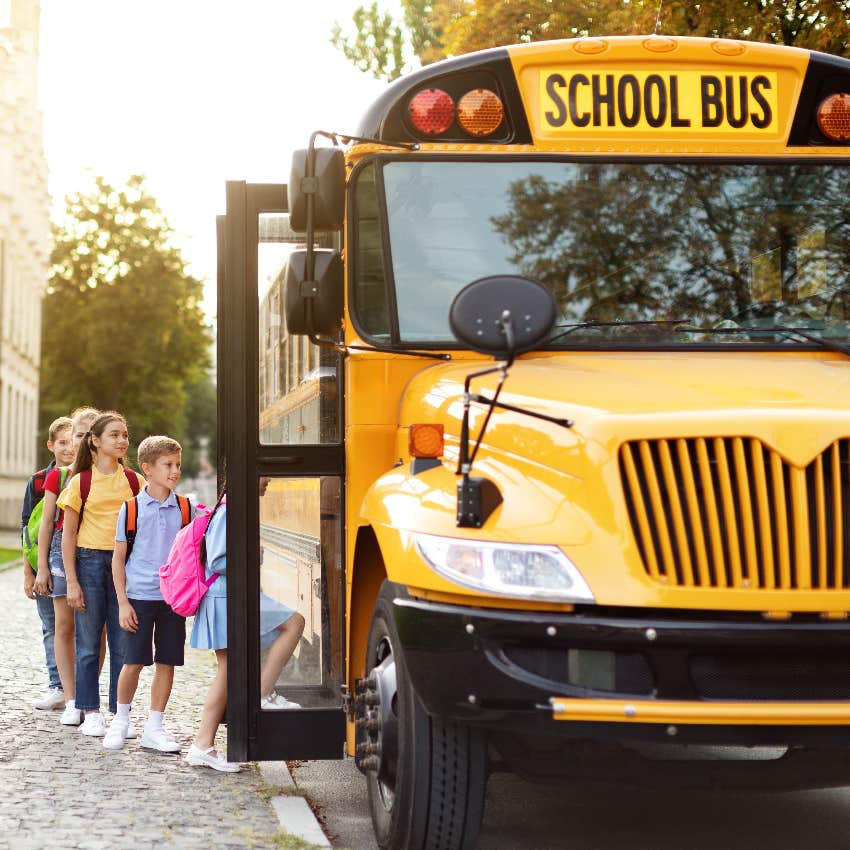Teacher Says Parents Who Don’t Do These 5 Things Make Elementary School More Difficult For Their Kids
To give your kids the best chance for success, focus on the fundamentals.
 PeopleImages.com - Yuri A | Shutterstock
PeopleImages.com - Yuri A | Shutterstock All parents want the best for their kids, and that includes their education. But it's not like they go to school WITH their kids, right? There's only so much parents can do to impact their success.
Yet, Mr. Wilson, a fifth-grade teacher, says there are some very simple, fundamental skills that parents often ignore that have a trickle-down effect on their kids' education and readiness for school.
Here are 5 things parents don't do that make elementary school more difficult for their kids:
1. They don't structure their kids' technology use and screen time
Surprise! A teacher REALLY wishes parents' would be a bit more proactive about screen time.
Wilson's primary reason is the one you might guess. "All these games, social media, and TV shows are designed to nurture a short attention span," he said.
This becomes especially critical as kids reach the end of elementary school.
"Fifth grade is kind of a big jump of maturity, especially before middle school," Wilson said, "because, for the first time in their lives, they're asked to be stewards of their own education." They can't do that effectively if their attention spans are shot!
Wilson also cautioned that tech and screens present a safety issue, both in terms of physical safety and being exposed to topics and content they're not yet mature enough to handle.
"It [also] screws up your children's sleep schedules," Wilson went on to say. This is because the blue light that emanates from screens, which is in a similar color spectrum as sunlight, impacts everyone's circadian rhythms and the secretion of hormones like melatonin that manage the sleep-wake cycle.
That's bad enough for you and me, but for growing kids' bodies and brains, it's even worse. "You gotta structure that mess," he cautioned, "because it may be to your kid's detriment if you do not."
2. They don't give their kids the responsibility of knowing their after-school transportation plan
"Your child absolutely needs to be able to identify your car or the car of whoever is picking them up," Wilson said. "Your child needs to know how they're getting home."
This might sound crazy to a lot of us, but he says that tons of kids in his school have no idea about these details, particularly when their transportation plan varies from day to day — they don't know which day they go home in a car, which day they take the bus, and which day they walk.
 Prostock-studio | Shutterstock
Prostock-studio | Shutterstock
That's really dangerous, of course. But it's also a vital executive skill — it teaches kids independence and how to be conscientious about caring for and managing themselves, which is vital for their development.
"When you wake them up in the morning, and you're getting them ready," he advised, "make sure that you all recite what that plan is before they leave your sight." This includes the details of the car itself — make, model, and color.
3. They don't make sure that their child knows how to get to their home
With the way phones and GPS handle everything for us nowadays, as well as how many kids are driven to and from school, it's not surprising that a lot of kids don't know the basic details of where they live and how to get there.
Not only is this a safety issue, but it's another missed opportunity to teach your child how to take ownership of their day-to-day, which impacts all aspects of their lives, especially their education.
Wilson says to make sure your kids know not just where to take a left or right but "the exact cross streets where they live." If they can't walk to and from school without GPS on their phone, "They do not need to be walking home," he added because he's seen kids whose phones died get lost and end up in unsafe situations.
4. Their kids don't know their parents' names — or sometimes, even their own!
OK, this may sound a bit nuts, but Wilson said, "I wouldn't be saying this unless I had seen it, right?"
He admitted that he has had "way too many conversations" with kids where he asked them their parents' names so he could reach out, and was met with, "I think it's…"
This obviously presents a safety issue should a child, say, get separated from the group on a field trip or during a crisis like a fire.
Even more of a problem? A lot of elementary kids don't know their OWN names because they've been called a nickname or a term of endearment all their lives. This of course only happens to little kids just starting kindergarten, but Wilson says that once your kid is heading to school, they need to know their name isn't "pumpkin" or "baby."
5. They don't teach basic skills like tying shoes
Now, hopefully, a kid knows how to tie their shoes by fifth grade, but Wilson says you'd be surprised! And this is the kind of thing teachers just don't have time for.
"This one is goofy," Wilson admitted, but "it's actually emblematic of a bigger issue" about independence and the development of critical self-management skills.
"If your kid has made it all the way to the fifth grade and they cannot tie their shoes," Wilson cautioned, "you may be doing a little bit too much for them." He urged parents to consider that "making things too simple for our children makes it tough for them to improve and grow."
So if you're still tying their shoes for them or buying them Velcro ones to avoid it, "you might be harming them more than you're helping."
Paying close attention to these subtle details just might make all the difference not just in your kid's education but their development as a person, and that's what childhood is all about.
John Sundholm is a writer, editor, and video personality with 20 years of experience in media and entertainment. He covers culture, mental health, and human interest topics.

